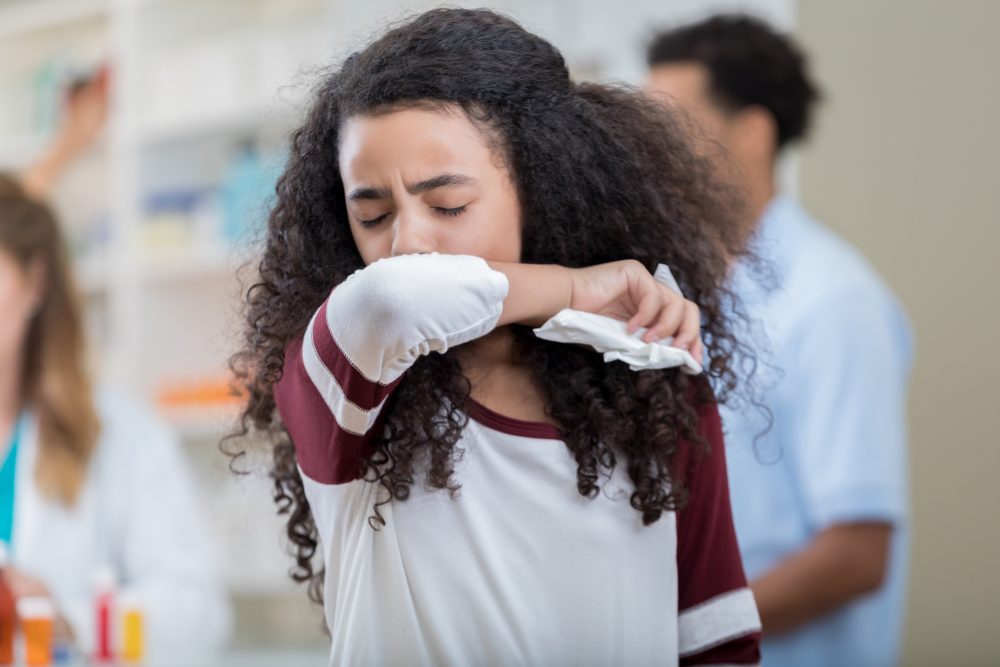UAE flu season: Is it OK to send your child to school with a cough? UAE teachers and doctors answer your questions
It’s a busy week at work, you’re rushing to get everyone out the door and onto the school run, but then you notice your child is coughing. You have a choice: send them back up to bed and keep them off school until it goes? Or drop them off anyway and hope it’s just a passing tickle?
Which one would you do?
When it comes to school and student sniffles it can sometimes seem as if parents cannot win. Whatever decision you make will seemingly have a downside you could be criticized for.
If you send your child to school with a cough, you can be accused of contributing to other children falling ill – not to mention your children going to school not feeling 100% well.
But if you don’t send them, and it turns out not to be anything serious, then you can be accused of denying your child vital days of their education unnecessarily.
And all that’s aside from the constant juggling act of childcare arrangements and office commitments for working parents when a child must be kept at home.
It’s a constant series of risk assessments, logistics balancing and guesswork. And very often, it’s a lose-lose.
But how often is too often for your child to fall sick? How can you protect them from illness during the UAE flu season? And is it ever OK to send your child to school or nursery with a cough or runny nose? Here’s what the experts had to say…
NB: If you are ever in doubt about your child’s health, we would always recommend that you consult a doctor who will be able to offer professional advice. The guidance below might give you a little more insight from an educational perspective.
My child seems to be falling sick more now than ever. Why is this?
If your little one seems to be catching every cough, cold and flu going, you’re certainly not alone.
Katherine Morris, School Doctor at Horizon English School says:
“The start of the school year and the period after mid-term breaks is a very common time for children to fall sick, as they return from their travels, often bringing viruses from the places they have visited. As they start to mix in groups it is inevitable that the viruses will be passed between them.”
“Autumn is also the start of the flu season in Dubai, so the number of viral infections will continue to rise from now, and peak during the winter months. Although the weather in Dubai is never very cold, we follow a similar pattern to the Northern Hemisphere. An annual flu vaccine is recommended to protect children against seasonal influenza.”
The flu vaccine is licensed to be given to children starting from 6 months old. Children aged 5 years old and below are classed as in the vulnerable category when it comes to flu, making them more susceptible to potentially life-threatening complications, so doctors say it is particularly important that children aged between 6 months and 5 years get the flu shot every year.
Children below 10 years old are also more likely to suffer from the flu in Dubai, according to data released by the Dubai Health Authority (DHA), further underlining the need for them to be vaccinated.
Why is my child always falling sick at this time of year? Is it really the “change in weather”?
As the cooler months arrive so too, it seems, do the bugs and viruses that can make kids sick and mean they need to be kept off school. You’ll often hear people blaming “the weather change” for a child’s illness, but is this true or just an old wives’ tale?
There is more truth to it than you might expect; there are well-documented links between weather conditions and infectious or insect-borne diseases, and doctors suggest that cooler or drier weather can dehydrate and create cracks in mucus membranes, enabling viruses to settle and enter the body.
My child has only just started school for the first time this year, but she has been off sick for almost as many days as she’s been at school. Is this normal?
“Once children start interacting with a wider social circle, they do tend to pick up minor illnesses as their immune systems develop – coughs, colds and runny noses are all common as they build their defences,” says Rebecca Howells, Primary Assistant Principal at GEMS Wellington Academy – Al Khail. “This usually occurs during the pre-school or Foundation Stage years, so it is likely that our youngest learners will experience some minor illnesses during this time.”
However, some children seem to be more affected by this than others, says Howells:
“Several factors may contribute to this, including sleep, nutrition, health, well-being and previous exposure to social groups. Some factors may be completely out of a parent’s control; for example, some children at the sensory-exploration stage are more likely to place environmental objects near their mouths, causing them to pick up germs. With time and patience, illnesses at this age will become less frequent.”
“It is fairly common for a child to get sick when he or she joins a school or nursery,” agrees Dr Puneet Wadhwa, Specialist Pediatrician at Prime Hospital (primehealth.ae). “You can consider it as a normal chapter in the development of a child’s immunity.”
How can you tell the difference between a non-contagious ‘sniffle’ (runny nose or cough) and something that is infectious?
Unless a child is known to suffer from allergic rhinitis, it is likely that any sniffles they develop are due to a virus, which will be contagious, says Dr Morris from Horizon English School:
“Signs that it could be an allergy rather than a virus are:
- very persistent sneezing
- itching red and watery eyes
- an itchy (rather than sore) throat
- a quick response to antihistamine.
“Allergies are more likely if the child has a history of eczema or asthma, or if they have a family history of allergies.”
As a general rule all infections are contagious, agrees Prime Hospital’s Dr Wadhwa:
“If a child has a fever with cold, cough or flu symptoms, he is potentially infectious to others – but often it may present without a fever, or a mild fever is often missed.”
“While allergies are not contagious, if a child has an allergy-related cough or cold that is lingering, it needs medical attention to bring it under control.”
“Plus, allergies and contagious sickness can coexist in a child at the same time – in fact it is fairly common – so again take medical advice to determine whether a child is contagious or not.”
“Even if it is a cough they have had for a long time. It should be evaluated and treated at the earliest to avoid any long-term complications.”
How many times is it normal for a child to be sick in a year?
When it comes to the question of how many times it is normal for a child to get sick, Dr Wadhwa says there is no single answer:
“A child may get between two and 10 respiratory infections a year, so the range is wide,” he says. “Generally, by the time they join school at the age of four or five these start to become less frequent, and by preadolescent age they are even less frequent.”
GEMS Wellington’s Howells adds:
“During the pandemic, many children had limited interactions with others outside of the family home – some weren’t able to attend baby or toddler groups for example. We find that these children may be more likely to pick up minor illnesses when they begin nursery. Giving children social experiences, with people outside of the family, can help to build immunity.”
How can you avoid a child falling sick when they first start school?
“To an extent it’s avoidable through the implementation of proper hand and food hygiene – especially when it comes to the stomach flu and diarrhoea,” says Dr Wadhwa:
“For coughs, colds and respiratory infections hand hygiene will help to reduce the spread, but it’s not usually possible to avoid spreading it altogether, as is the case with stomach bugs. Sicknesses due to allergies can be avoided altogether by keeping a check on the triggers of allergies.”
I’ve heard it is a good thing for children to get sick to build up their immunity. Is this true?
“Exposing children deliberately to sick people is not recommended to develop immunity,” says Dr Wadhwa. “Some studies are underway – like the hygiene hypothesis – which are looking into this concept, but the results are still inconclusive.”
This is a broad question, with no straight answers, adds Dr Wadhwa:
“Some infections are nasty and life-threatening or life-changing. We already have vaccines for some of the most deadly diseases, or the ones which leave us with permanent disability, like polio or meningitis. These are to be avoided at any cost.”
How can you tell if the frequency of sickness is normal, or if it could be a problem with your child?
Every child has to be evaluated individually, so it’s better leave it to a paediatrician to decide whether the frequency falls within a normal range, or if something needs to be investigated further. “As a general rule, a child should be growing well physically and developmentally, and any major issues need to be ruled out,” says Dr Wadhwa. More serious problems might only have subtle symptoms, so always take medical advice if you have any concerns.
“Try not to google as it will create more confusion. Ask your paediatrician for a trusted and standardized source of online information managed by medical professionals and stick to that information source only.”
Sometimes it can feel as if parents are torn between wanting to ensure their child does not spread a contagious illness, and ensuring that they do not miss valuable days of school. What is your advice to parents in this situation?
Dr Morris of Horizon English School says:
“This is a great question, since school age children have on average 6-8 viral illness per year. Symptoms can last up to 2 weeks, which can add up to a lot of time!
“As a rough guide, children with a fever, diarrhea or vomiting, unidentified rash, very heavy nasal discharge, or a persistent or productive cough, should stay at home. If they feel well, are eating and sleeping as normal, and their nasal discharge and cough are mild and resolving, they should be ready to return to school.”
“It will also make a big difference if you can teach your child to cover their cough and practice good hand hygiene.”
The UK’s National Health Service echoes this advice:
“It’s fine to send your child to school with a minor cough or common cold. But if they have a fever, keep them off school until the fever goes.”
However, individual schools will have different policies with regards to symptoms and staying home, and it is always best to get the advice of a medical professional.
“We are aware that symptoms such as runny noses are common and can be linked to allergies, such as Rhinitis, and in these cases a medical certificate from your doctor will prevent children from being sent home from school unnecessarily,” says Rebecca Howells of GEM Wellington Academy – Al Khail. “If your child is over two, rubs his/her nose and/or sneezes a lot and has a clear runny nose (that lasts for extended periods of time) without fever, then he/she may have allergies. Your paediatrician can help you work out the cause of the allergy, which may be treatable.”
When should parents keep their child home from school or nursery due to sickness?
“Whenever a child has a fever, vomiting, or is feeling weak and not his or her usual self, he or she should not be sent to school,” says Dr Wadhwa.
“If a child has a known allergy then the paediatrician’s advice should be followed, and if symptoms are excessive then they should be kept at home and medical advice should be sought.”
Howells adds:
“We would recommend that if a child has symptoms such as: a fever, sore throat, persistent cough, an unusual rash, vomiting or loose bowel movements they do not come to school and parents should seek medical advice. Children should not return to school until 24 hours after symptoms subside.”
UAE FLU SEASON Q&A
The flu season in the UAE tends to follow the trend of the Northern hemisphere, running roughly from September until March.
Following the relaxing of COVID-related restrictions this Autumn – including the wearing of protective face masks – cases of flu have risen back to the expected pre-pandemic levels, according to UAE health authorities.
The Abu Dhabi Public Health Centre (ADPHC) has called on all community members – especially children, elderly, pregnant women and those with chronic diseases – to help combat the higher flu figures by getting vaccinated against seasonal flu.
As we enter the peak of the flu season in the UAE, here are some commonly asked questions about the flu vaccine.
Who is the flu vaccine for?
The flu vaccine is approved for use on children aged 6 months and above, but not for babies under 6 months old.
The flu vaccine is especially recommended for children between the age of 6 months and 5 years, since children aged 5 and under are considered to be in the vulnerable category when it comes to flu, meaning that they are at a higher risk for more serious complications if they do catch it.
However, figures show that almost half of all flu cases in Dubai are in children aged 10 and under, so it is recommended that children of this age range also receive the vaccine.
Could the flu vaccine give me or my child the flu?
This is a common myth but is based on several misconceptions, according to the UAE Department of Health, which states that the flu vaccine will not cause flu because the vaccine contains non-infectious particles of the virus, which just alert the body to the threat of the virus.
Although a small minority of people might develop flu-like symptoms, such as mild fever and muscle aches after vaccination, these are considered as minor side effects and are not the same as a full-blown influenza infection.
Additionally, immunity against influenza does not develop until 1 – 2 weeks after vaccination. So if you catch the flu post-vaccine, it’s possible that you were exposed to the influenza viruses before getting the benefit from the vaccine.
Sometimes it can also be difficult to tell the differences between flu and common cold. Both are respiratory illnesses, and may have similar symptoms, but both are caused by different types of viruses. The influenza vaccine only protects against certain influenza viruses.
How many doses of flu vaccine are required?
You need to take 1 dose of flu vaccine every year. However, children below 9 years need to take 2 doses of the vaccine, 4 weeks apart, if they are taking the flu vaccine for the first time.
Can I still get the flu if I have the flu vaccine?
Studies have shown vaccination helps protect against infection but post-vaccination protection levels are not 100% so there is no guarantee you will not get the flu. However, if you do end up getting the flu post vaccination then it is likely to be milder and shorter lived than it otherwise would be.
Why is it necessary to get the flu vaccine every year?
Flu virus strains mutate every year, so new flu vaccines are produced every year to protect against current strains, which is why yearly vaccination is required. Every year, members of the World Health Organization (WHO) in the Global Influenza Surveillance Network identify the flu viruses circulating in the upcoming season that may lead to severe complications, reports the UAE Department of Health. Flu viruses are able to mutate and evolve very quickly, so the vaccine which was taken in the previous season may not give protection from the viruses circulating in the next season. In addition, immunity level against influenza viruses starts to decline over time.
How do I get the flu shot?
Simply call up your local physician and book an appointment. Some insurances will cover it and some won’t. If you are not covered the cost varies between around Dh75 to Dh250.
What can parents do if they suspect their child has flu?
The basic advice is to keep your child warm and hydrated and use children’s paracetamol and ibuprofen to control temperature. Normal body temperature for a child is 37ºC. Because of the COVID-19 pandemic it is advisable to consult a doctor if your child is exhibiting any signs of the flu, and also to keep children off school and away from public places if they are displaying any symptoms.
© SchoolsCompared.com. 2022. All rights reserved.






























































Leave a Response